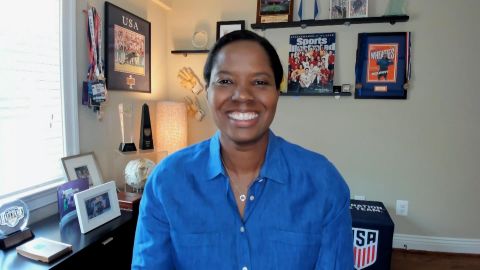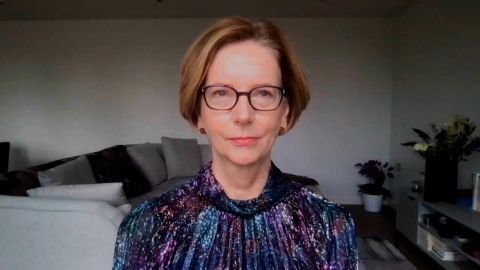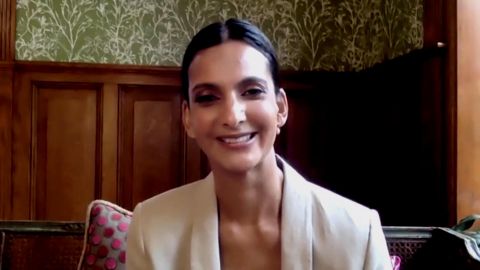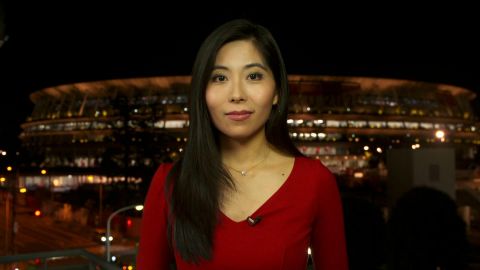Read Transcript EXPAND
BIANNA GOLODRYGA: Now, we want to turn to the importance of female representation in film and television. A recent study by UCLA shows that minority women make up just one quarter of film writers and one fifth of directors. Here is actress, Poorna Jagannathan, talking to Aarti Shahani about her role as a tiger mom and the hit Netflix show by Mindy Kaling, “Never Have I Ever.” And why diversity is so important in this golden era of streaming.
(BEGIN VIDEO CLIP)
AARTI SHAHANI: Thanks, Bianna. And, Poorna Jagannathan, it is so wonderful to have you with us today. Thank you.
POORNA JAGANNATHAN, ACTRESS, “NEVER HAVE I EVER”: I’m so excited about this. Thank you for having me.
SHAHANI: I loved watching the second season of “Never I Have Ever.” And I am clearly not the only one. The show is a global phenomenon. A huge hit in the U.S. and sweeping the world as number one on Netflix, and India, South Africa, Peru, Germany, France, Brazil. Many more countries. Why do you think, Poorna, the show resonates so strongly with audiences around the world?
JAGANNATHAN: I mean, you know, you hear it a lot, and it’s so true. The more specific you are in telling the story, somehow it becomes more universal. And this is — it resonates because there is so much diversity, not only from the camera into the actors you see and, you know, who they are, but a diversity in storytelling. So, in season 2 you see, you know, a baby tackle horniness.
(BEGIN VIDEO CLIP)
JAGANNATHAN: You kissing? Your father’s actions are (INAUDIBLE) because they drift off to sea.
UNIDENTIFIED FEMALE: I just got overcome with emotion.
JAGANNATHAN: What are you going to do at my funeral, just have sex on top of my grave?
(END VIDEO CLIP)
[13:40:00]
JAGANNATHAN: And you see how she battles with mental health. You see her friends tackling sexuality and there’s — you know, in our home, there is intergenerational conversations happening. And there is, you know, these different shades of feminism that come up within small households. So, just again, like the breadth of people and topics. You’re — and not in any way diluted. Like fully actualized, wonderful three-dimensional characters, you know, conveying these story lines so beautifully. I think you just — being a child or being an adult, you just find yourself somehow within the storytelling.
SHAHANI: Your character on the screen, Nalini, what struck me is how much she actually evolves in season two. In season 1, I would say she’s more of a stereotype. You know, tiger mom who wants her daughter to have straight A’s and go to Ivy League School. And in season 2, as I see it, she transforms into more of a full woman with needs who is aching to belong, right? Can you talk a little bit about that? That — the way your character evolved.
JAGANNATHAN: When I was in the process of accepting a job. It was — obviously, it was from Netflix. But one day, when the papers came through, I saw YA next to it. And I don’t watch the genre. I didn’t even know what like (INAUDIBLE) stand for. And it stands for young adult. And I stopped in my tracks for a second. And had to have a conversation with Mindy and Wang because I was not in that part of my career where I wanted to portray a Disney mother.
(BEGIN VIDEO CLIP)
UNIDENTIFIED FEMALE: How could you move on so quickly?
JAGANNATHAN: I haven’t moved on at all. I miss your father so much that it physically hurts. I guess I just wanted a break from that pain.
(END VIDEO CLIP)
JAGANNATHAN: And I had too many important stories of immigration that weren’t told. So, I had a conversation about them and they were like, you know, Mindy and Wang, just, you know, so assured me and they said, it is such a deeper storyline, we don’t even know how to write like that. This woman, you know, has a full character arc, you know, which was wonderful. So, even in season 1 you do see these unbelievable breaks in her tiger mom parenting, right? These unbelievable like fractures where the grief will come through. And there was — by episode 2, she has a mis character which that kind of stuff was not shown for our community, a loss and grief and what women struggle with and what being a mom means, it’s not shown. So, it was a huge breakthrough.
SHAHANI: And that’s interesting, that point of being so three dimensional. Your character also develops a romance with a fellow doctor. He is played by the rapper and actor, Common. Let’s have a look at that for a moment.
(BEGIN VIDEO CLIP)
JAGANNATHAN: I am so mortified. That must have been the worst date of your entire life.
COMMON: No. I once got stuck in a rotating restaurant that kept speeding up.
JAGANNATHAN: Chris, I do not think this is going to work out.
COMMON: Because of your daughter?
JAGANNATHAN: And honestly, with me too. I think it might be a little too soon. I think I will be ready in a few years, but you will probably be snatched up by then.
COMMON: Oh, I don’t know. Some people don’t like me when they first meet me. Maybe I’ll see you in the elevator.
JAGANNATHAN: I look forward to that.
(END VIDEO CLIP)
SHAHANI: An Indian widow longing.
JAGANNATHAN: You know, this — what I love about season 2, what I love about the show, it is a very complex anatomy of grief actually. Like as I was going through episodes and especially the scene where she says, I’m not ready, and then coming back to that previous scene where, where she gets caught by her daughter and gets ratted out, is just, you know, the difference between when you lose someone, it’s — probably is the difference between what does moving forward versus moving on really look like. You know, and she’s just trying to move forward. Maybe she’s trying to move forward. And there’s a couple of steps back that they have to take and it is not moving on. It is, you know, far from moving. I don’t even think it’s been a year since her husband died and it is a very delicate, very intricate nuance portrayal of grief for me.
[13:45:00]
SHAHANI: Another aspect of the scene, it is not just this exploration, as you say, of a woman who is grieving and trying to figure out how to be seen and piece life together. There is also a really interesting racial subtext going on in the scene. Common is African-American. And you and I well know that racism, colorism runs deep in the South Asian community. And I wonder if watching that, the choice of casting him, making him your love interest. Did Mindy Kaling and other show creators intentionally set out to take this on, to challenge, you know, South Asians in the era of Black Lives Matter?
JAGANNATHAN: So, there is a couple of things that are happening. I think this show normalizes a lot. And I — yes. I mean, like, a black, brown love shown on screen without like people killing themselves is like — that’s a whole new thing.
SHAHANI: Well, we see White House in the form of the vice president. But in pop culture, less so.
JAGANNATHAN: This is — it is not normalized. And I love to talk about that. There is so much in here that doesn’t have subtitles and doesn’t have an explanation. My use of (INAUDIBLE). My — you know, the stuff that we do. There is no addendum to any of the things that we do. You know, Devi’s personality and her loneliness and her — anything doesn’t have a bibliography attached somehow. There is also no characters translating what — like if I speak something (INAUDIBLE), no one is translating it into English. And I think this was another thing of normalizing a black/brown relationship without any explanation and any of the drama at all. However, Common was a huge fan of the show. And I know Mindy and Wang heard of it. And so, when they were thinking of a love interest, I think they kind of thought of him first.
SHAHANI: When you say that the show normalized without over discussing the fact of normalizing, do you believe that the crew, the creators went into it aware of the colorism and the South Asian community and kind of knowing, we’re going to be challenging a bit here? Was that ever a conversation.
JAGANNATHAN: No, I think they do it all the time. I don’t think it is anything is — they are way too smart for anything to be a coincidence. They’re really — it is the most diverse writer’s room that I have ever been, you know, in a show. I think more than 50 percent are people of color and there’s different sexualities and I think there are four South Asians in the room. It is — I think everything in there is deliberate. You know, I think — and I think the goal is to move conversations forward to normalize, to mirror and to portray new ways of being.
SHAHANI: There is a real power in that. Well, let’s talk about the writer’s room, the diversity of it. People of color in addition to Mindy Kaling. How does that diversity impact the scripts that you get and the role that you end up playing?
JAGANNATHAN: It is such a great question because it’s been on my mind a lot. For diversity in front of the camera to work, it actually needs an ecosystem of diversity behind it. And I think Mindy and Wang have created just that. So, the producers, the show runners, the team of — in Netflix, you know, we have a broadcast, we have (INAUDIBLE) and we have, you know, stripping down to a writer’s room that is radically diverse. And each one will tell you they have never been in a more diverse room before. And how — you know, when you are the only brown girl in a room and you present a storyline, you present an idea, there is no one to back you up or no one to add kind of those tributaries, like those additional stories that can flesh it out. So, there is, you know — so, I kind of remember Mindy saying that it was a very cathartic thing to be in the writer’s room because all these young girls were saying, that happened to me too and that happened to me too. And I think the power of this show is the actors feel like they can grab this material and they can own it. But what happens to the audience member, is they look at him, like, OK, how do they know that? How — that detail, how did they know that happened to me? So, there’s — it’s so personal because it is coming from real lived in experience, which is not the case in other shows, which is mindboggling to me.
SHAHANI: Poorna, let’s talk about Hollywood as an industry. According a UCLA, study women make up one quarter of film writers, one fifth of directors. Minorities, one quarter of writers and directors. And they are – – or I should say, we are working with less money. White film directors are more than device as likely to have a film budget of $100 million or more. These are astounding figures. These are disappointing figures. Do you see on the ground, from your vantage point, people of color, (INAUDIBLE) of color gaining traction, like true traction or do you see the surge in diverse content more as kind of a blip on the map, a reaction to MeToo and Black Lives Matter but not really a sea change?
JAGANNATHAN: No, I really don’t. I mean, I think there are more places to tell your story now, you know, Netflix and the Hulu and the Amazon. And therefore, more stories are being told. And I think more people are given chances. So, like “Ramy,” the budgets aren’t huge or even our show, the budgets are really not huge.
SHAHANI: You start in “Ramy” as well.
JAGANNATHAN: Yes, yes. And the — so, I do think shows like ours and “Ramy” and movies like “Crazy Rich Asians” and “The Farewell,” they all start — you know, when you string them together, you start seeing a bigger story being told, which is diversity works. And like the show, it works bringing a global audience, one that is really — it is very desirable for a streaming platform or, you know, any service. And as you start connecting the dots — and these are — these movies and shows just happen. Like, we were in a very — you know, it’s like four years maybe. So, it’s a very recent tale. But they are — they resonate and they are profitable. And maybe —
SHAHANI: You see, because I’m quite optimistic about it. And do you feel like, you know, there is the representation you see on the screen like, oh, look, South Asians get to play doctors and engineers. Is that the shift that we are seeing or do you actually think we’re breaking away from that narrowness?
JAGANNATHAN: I think it is people like us who are breaking the narrative. Because as — you know, Mindy Kaling or “Ramy,” they — it’s them telling their stories, right? So, it is not a Caucasian person or someone who is coming in and saying, let’s diversify. Let’s get you out of that — you know, that modern minority thing. I mean, I think if Hollywood had its way, we’d still be doing a lot more doctors and a lot more scientists. But I think it’s people — it is an inside job. They are telling their own stories and using different ways to tell it. And their stories is — you know, they are messy human beings and, you know, they are deeply flawed. And that’s the part that, I think, as a — as an actor, the other parts I was playing just — you know, I often say that the problem with the minority, that the problem is share types (ph) is not that they are untrue but, you know, they are incomplete. So, it’s basically the same (ph). And I felt in my other roles, I’d show up and I could never be my full self on a set. Not even a sliver of who I am. And some (INAUDIBLE) set like “Ramy” or “Never I Have Ever” and I can bring everything.
SHAHANI: Poorna Jagannathan, I want to thank you for speaking with me.
JAGANNATHAN: Oh, this was so lovely. Thank you for having me.
About This Episode EXPAND
Selina Wang; Briana Scurry; Julia Gillard; Poorna Jagannathan
LEARN MORE



